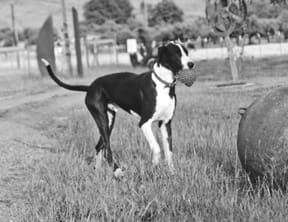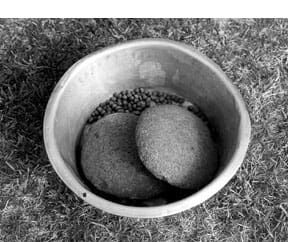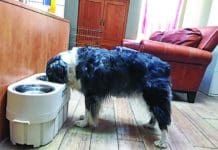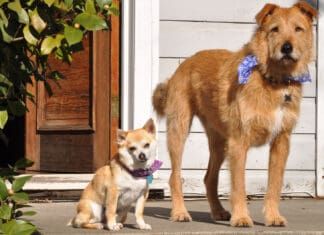Gastric dilatation-volvulus, or “bloat” for short, is a feared disease among many dog owners. I have worked as an emergency veterinarian and have observed first-hand the horrible effects of this condition on a number of my patients, and I can certainly attest to its devastating effects.
Knowing what bloat is, and learning to recognize its clinical signs early is important for all dog owners so you can ensure prompt treatment before simple bloat progresses to irreversible and fatal whole body shock. Certain dogs are more likely to become a victim of this horrible stomach disorder, so it helps to know what those breeds are in case your dog is one of the more statistically likely candidates for the illness. And finally, it also helps to know how it is treated, and whether there are any preventive measures that can be taken to keep your dog from ever becoming a victim of bloat.
What is Bloat in Dogs?

The technical term for bloat is gastric dilatation. Simply put, this means the stomach dilates and enlarges. The main constituent of this dilation is air, although food and water are usually present in the stomach as well. This makes bloat quite different from a simple case of over-eating, where the pet engorges on food and the stomach fills rapidly with the last meal eaten.
Why does the stomach fill rapidly with air? The main cause seems to be aerophagia, where the pet literally swallows a large amount of air. Most commonly this is from eating too quickly. Unfortunately, for some reason, the air is not passed into the intestines or belched back out the esophagus. No one knows what causes the stomach to retain air.
Another theory is that after eating, some pets swallow air as they exercise, causing the stomach to bloat. While many doctors advise clients not to allow their dogs to exercise immediately after eating, I do not know of any controlled studies that show conclusive proof that exercise restriction prevents bloat. In many of my patients there was no history of exercise immediately after eating that contributed to the bloating. And since wild dogs and their ancestors (wolves) may need to be on the move after a meal (although, given the chance they usually rest to digest their food and recover from the recent kill), I doubt that exercise is a major factor in bloating. Still, until evidence proves otherwise, many veterinarians discourage exercise for 30-60 minutes after eating.
One of the myths regarding bloat is that only large dogs can develop bloat. It is true that bloat is more commonly found in large and giant breed dogs and deep chested dogs, usually two to 10 years old. The most commonly affected dogs include Great Danes, German Shepherds, Saint Bernards, Labrador Retrievers, Irish Wolfhounds, Great Pyrenees, Boxers, Weimaraners, Old English Sheepdogs, Irsih Setters, Bloodhounds, and Standard Poodles. However, any dog can develop bloat.
Another myth involves feeding your dog from a raised bowl as a way to prevent bloat. Feeding from a raised bowl can be very helpful in some dogs with a disorder called megaesophagus (where the dog repeatedly vomits up his food because the food has difficulty passing into the stomach). However, I have not seen anything in the veterinary literature that confirms that a high feeding table can prevent bloat (although, as you’ll see, there are some things you can do to minimize the chance of your dog bloating).
Some owners feel that feeding only cereal-based foods will cause bloat, or that dogs eating raw diets will not bloat. It is true that cereal-based foods ferment more in the gastrointestinal tract, which can cause excess gas, but this occurs further along in the intestinal tract (mainly the large intestine.) The only thing I have seen repeatedly suggested in the literature is that excess calcium in the diet, and excess air being ingested with the diet, may contribute to bloating in some dogs. Dogs can develop bloat no matter what diet is fed.
Bloating is a Life-Threatening Condition
Regardless of the actual cause, bloating in dogs is one of the few true emergencies in veterinary medicine. Dogs can and do die if not treated promptly. As I’ve mentioned, with bloat the stomach fills with air that it cannot expel. The bloated stomach compresses blood vessels in the stomach wall and abdominal cavity, causing hypovolemic shock. In severe cases, this bloated stomach can actually twist on its longitudinal axis. This twisting or torsion is called volvulus. As the stomach twists, it may pull the spleen with it, causing torsion of the spleen. If not treated promptly, both the spleen and stomach will die as the twisting cuts off the blood supply to these organs. Treatment involves decompression of the air-filled stomach and surgery to reposition the stomach if rotation occurs.
In an emergency case of bloat, pressure may be quickly relieved by inserting a large gauge needle (14-18 gauge) through the skin and right into the bloated stomach. This is only temporary treatment, but it does buy time and give the dog quite a bit of relief. After this temporary needle decompression, the dog is lightly anesthetized with an intravenous anesthetic (due to the shocky condition of most patients, less than half of a normal dose of anesthetic is usually all that is necessary to cause anesthesia).
Then two tubes are passed into the dog’s mouth: one goes into the trachea (windpipe) and one goes down the esophagus into the stomach. The stomach tube will be used to “pump the stomach,” removing food, water, and any remaining air. The tracheal tube is used to protect the airway so that no food or water accidentally enters the lungs. Other conventional therapies that may be used include IV fluids and corticosteroids (for shock) and antibiotics to prevent secondary infections. Homeopathic therapies such as Arnica can be used in the post-operative period to assist healing, and acupuncture can be used for pain control.
Surgery for Bloated Dogs
Dogs with volvulus will require surgery. Surgery has two objectives: to assess the damage done to the stomach, spleen, and other organs, and to reposition the stomach into the proper position. Stomachs that sustain severe damage cannot be repaired, and these patients must be euthanized. Stomachs with mild damage can usually heal after repositioning. Veterinarians hope that the surgery prevents future occurrences, as well.
The techniques to reposition the stomach is called a gastropexy, and involves literally sewing the stomach to some part of the body. Most commonly a circumcostal gastropexy is performed. In this technique, the stomach is sewn to the rib cage. The surgery is quite effective in preventing future episodes of volvulus, but no surgery can prevent bloating.
Owners of larger breed dogs (who might be prone to bloat and volvulus) have asked me about the feasibility of performing a gastropexy to prevent any episodes of bloating. I advise against this for several reasons:
• We can’t prevent bloat with this surgery, only the torsion (volvulus) that can accompany episodes of bloat.
• While nothing is guaranteed, following certain prevention tips can help reduce the incidence of bloat.
• I prefer not to subject pets to the inherent risk of unnecessary surgeries.
• I have seen no evidence that this prophylactic approach is worthwhile since gastric dilatation volvulus may never occur in any given pet.
If you are considering such a prophylactic surgery, I would advise you to talk with your veterinarian and carefully consider all options first.
Preventing Dogs from Bloat
This is one of those conditions where prevention is much preferred to treatment. While there is no 100 percent effective prevention, here are the guidelines I use in my practice.
• Avoid feeding your dog too much calcium. Many supplements contain calcium. If you are feeding your dog more than one type of supplement, check the labels carefully and “do the math” the determine how much calcium he receives from his diet and supplements.
• Feed small, frequent meals (2-4 meals per day). It’s a hassle, but the payoff is worth it. (There are some trainers who never feed their dogs out of a bowl, but who feed their dog its food as rewards for doing certain requested behaviors!)
• For dogs who tend to gulp their food, try placing large bricks or rocks in the food bowl. This forces the dog to eat around these obstacles, and slows the eating. Also check out these tips to slow down a fast eater from Dogster.
• No exercise for 30-60 minutes after a meal, and nothing hard (no hard running or playing.)
Because bloat is a true emergency, I encourage owners to be prepared at home. Ask your doctor for several large gauge needles to add to your first aid kit, and have the doctor show you how to properly perform needle decompression. This technique could save your pet’s life!
Dr. Shawn Messonnier is a holistic veterinarian in Plano, Texas.







great article for reading and understanding vovulus and bloat, plus potential cures. Thanks.
Does the dog still have an appetite if bloat is suspected?
My Heeler ate 4 eggs that feel on the floor this afternoon and has alot of gas tonight. Is she safe or should I take her to the ER?
I wish I would have known this information… my little boy, a 6 lb Yorkie, passed away suddenly yesterday morning from this condition. We didn’t even know what was happening and we felt SO helpless as we watched him die. The closest emergency was an hour away so we didn’t even have time to get help. If we had known about how to relieve the pressure, to buy some time, I think he would be recovering today. What I want to know is, is this a gradual disease or a sudden onset? He was gone withiin an hour and a half from first signs to finish.
This is a good article on understanding medically what bloat is but it doesn’t give the reader what the symptoms are if a dog is experiencing bloat. I truly doubt anyone without a medical background that actually recognizes the clinical symptoms of bloat, is going to feel confident enough to stick a trochar in their dog in hope of hitting the stomach. C’mon, Doc, give people what to look for and then tell them to get to an emergency hospital ASAP instead of telling them to practice veterinary medicine without a license.
This is very true, its like all vague description of what bloat is and how it starts, and gives us choice to experiment with our dogs or take them to vet and spend over 2000+.
My dog is too fat. And a pig. Not an actual pig. Eats like a hog. Out of the blue she just began to make this sorta quick and soft throaty noise in a slow but consistant pattern. I asked my Gma what was wrong with her(My Gma is her momma), She told me it was just a little old coughing fit, why she does that all the time. She is a tiny Chiuaua and although most commonly found in taller and narrower breeds, I wonder if maybe her tiny stature and what that entails if that could anyhow make what she is doing SEEM to be less serious than it is. For instace could her tiny un-demanding stature, or even her cuteness make it seem to be not as serious as it could be… that combined with her already high pitch, low volume, short distance carrying vocals…. Does this make sense? Bc I have asked my Gma about it more than once now, today was especially nasty episode. My grandma said she has allergies and does this often. She does the thing like u gotta get a lugee out repeatedly for spells. Well she is fat as a cow like a walking pumpkin. Real cute though. I love her. My Gma does too. But when I mention her over eating I noticed it sometimes sorta errks her in a way my Gma is very kind and loves to make sure all creatures and people’s are comfortable with a full belly. She spoils her, she is a bad better but she is her baby. She finishes her plate and then violently even sometimes takes her sisters. She looks like she is a about to bust. Again I love her so much. And my Gma is the BEST person I have ever met. Honestly she probably knows about all of this more than I do and is on top of it all and knows her shit. BUT….. the entire first THREE websites that I checked trying to be prepared for anything and educate myself well they ONLY had symptoms and call/go to emergency vet ASAP. Not ONE thing about HOW to ACTUALLY save the dog should either or both of those NOT be a possible option in a life or death situation. It DOES however tell you that it can happen very suddenly and without warning and that you have VERY little time to help them once it does and that it can even put them into shock which means it very will could happen while you are asleep, have head phones in, are not in eye or ear shot, mowing grass ECT. It says that there is not much time to prevent death after it begins. Second website said she has only ever seen FOUR dogs in her ENTIRE career survive and that it’s horrible, it ALSO says this is literally nicknamed THE MOTHER OF ALL DOG DEATHS….. The FIRST 2 places I looked which are the first website AND the original search results the #1 OFFICIAL Google answer(the one that appears immediatly upon searching, ON TOP OF and BEFORE the Ad’s and the last the beginning of the related website options) the question was ” CAN MY DOG KILL ITSELF BY OVEREATING) …. Answer: It is extremely unlikely and very rarely heard of. Usually a dog will simply vomit if it has eaten to much or will stop eating before it does. LITERALLY THESE ARE FACTS PLEASE CHECK IT….. SO finally SOME WELL REWARDED SCEPTICISM nearly TWO hours into nonstop researching going from top to bottom as Google gave it me. I understand why you said what you did. But this is information that is absolutely vital and THANK YOU SO MUCH THIS IS EXACTLY WHAT I WAS LOOKING FOR DOG YOUR AWESOME!!!! this should be in the number one Google answer. Because people’s dogs WILL continue to die because of the answer it gives right now that could be stopped. You see I already knew my dogs symptoms. That’s WHY I looked the symptoms up… Bloat was the answer. So I try to find how I could stop our dog from dying if ever the need should occur… Here I finally got a real answer. I worry A LOT of people would accept the official google answer or the first website shown. Of course call the emergency get or try to take the dog to one if it’s close. But if u believe it can’t KILL your dog as Google says then your not going to until it is to late anyway. And if you ALREADY know not JUST the symtoms but ALSO the currect diagnosis as YOU seem to be assuming people know well then you would have a better chance of your dogs survival at this point. But if for instant there is no service/signal/means of communication and/or transportantion and/or a Vet at the exact , immediate time that you somehow yourself SELF DIAGNOSE the dog….. alone…. from any random location, possibly even without ANY form of search engine/ obtainable information whatsoever available, well…… >Xp. And if NONE of that’s an issue… Well then you are ALREADY a trained and qualified professional with the intellegence experience capability AND equipment to pull off this procedure by yourself and never even see this web page. Sorry PLEASE SOMEONE HELP TO FIX BEFORE MORE DOGS DIE THAT COULD HAVE BEEN PREVENTED FROM ANY OF THIS. AGAIN THANK YOU SO MUCH FOR GIVING ME THE ACTUAL SOLUTION TO THE PROBLEM IF EVER I NEED TO SOLVE IT. THANK YOU!!!!
I just fed my Great Dane. We were sitting on the porch and she took off running after something…we live in the country. I have her in the house now, but what do I do now? Expect bloat? Very concerned!!!
My dog died of bloat, ran to the door to go out and started manically eating grass in our fenced yard to relieve the symptoms. We took him on the 7 minute drive it took to get to vets but he was dying as we carried him in. Death comes quickly with relief of that pressure.
I meant death comes quickly without relief of that pressure.
My beautiful bulldog who ate very slowly , went into the garden last Thursday and collapsed and was breathing very strangly. We carried her upstairs, her stomach swelled and her gums turned white and she threw up. We called the vet and they said to bring her right now by the time we got downstairs she was gone. The whole devastating thing from start to finish was 15 minutes. No warning, nothing. The vet said what we described was 100 % bloat. The only different thing was we changed her food from raw to dry as I thought she could get bugs from raw. She was drinking so much water after starting dry food. I did not know this was going to happen and if I had I would have kept her on raw food. We are devastated that our girl is no longer with us. Our vet said he has only had 2 dogs in 25 years with bloat. Sadly our beautiful girl was one of them. She was my shadow, everywhere I went she followed
Sorry. I meant death comes quickly withOut relief of that pressure.
I had a dog die from bloat almost two years ago. I thought I knew everything about bloat. Not to let them exercise or play for 1 hour after eating. Moisten her dry food etc. She was 29 months and a beautiful Shiloh Shepherd. The morning it happened we rush her to the vet. She did not display any of the typical symptoms of bloat. In fact I asked the vet if she could have bloat and she replied she did not think so but they did the ultra-sound she did. They started emergency surgery right away but it was to late and instead of continuing with the surgery we told the vet to put her to sleep. After that I did more research on Bloat, read everything I could get my hands on. The vet said that she does not see that many cases of Bloat and in fact our Bridgette was the first in a long time. We now have another Shiloh Shepherd, female and when we had her neutered we had her stomach tacked. But nothing is a 100% percent guarantee. One other I would add prior to this we had four other German Shepherd and no problems.
I neglected to says in previous reply, the reason we had gastropexy done on Abby, Bridgette was her first degree relative. Bridgette and Abby’s father were full blood siblings. I consulted with two doctors and the breeder before having this done. We did not go into this lightly. The surgeon that perform the surgery did tell us to limit her activity” no hard playing. ” Which is difficult because she is HIGH energy. She is now 20 months old. I hope this information will be helpful to someone. This is the reason I have sent this.